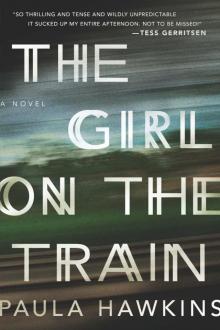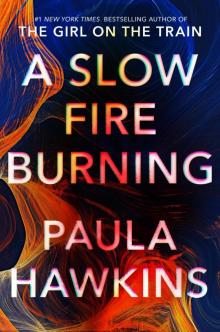- Home
- Paula Hawkins
A Slow Fire Burning Page 16
A Slow Fire Burning Read online
Page 16
Miriam lay in the ditch for a while after that; she couldn’t really be sure for how long. Eventually, though, she got up, and she climbed back over the fence, the flesh of her arms and legs and torso torn, her knickers soaked with urine, her mouth sticky with blood. She started to run, she fell, she got up. She kept going. After a while, she reached a petrol station. The man there called the police.
They were too late.
The One Who Got Away
She has been crying for a while now, this girl, crying out. She calls for help and bangs on the door until her fists bleed. She says her friend’s name. Quietly at first and then louder, and louder still, over and over, she calls her friend’s name until it echoes through the house and silences the birds and silences everything but her pitiful cries.
In this silence, a door slams and the sound of it is deafening, earth-shattering, a sonic boom. Louder than anything the girl has ever heard in her life.
Her crying stops. She hears movement, footfalls, quick and urgent and coming her way. She scrabbles backward, falling, twisting, ferreting into the corner of the room, where she presses her back to the wall, braces herself with either hand. Bares her teeth.
The footsteps slow as he approaches the door. She hears the scrape of boots against the stone, the rattle of the key in the lock, a click as it turns. Her blood is roaring and she is ready. She is ready for him now. She hears him sigh. Hush, now, big girl. Hush, now, ugly girl. It’s not your turn. There is another rattle, another click, and her blood subsides, her insides seem to shift, a wave breaking a dam. Hot piss drips onto the floor.
As he leaves, he hums a tune, and in a voice full of tears, he sings
What I took from her, I won’t give back
TWENTY-ONE
Carla moved through her house, room to room, checking and rechecking wardrobes, cupboards, the backs of doors, anywhere she might have hung the bag with the Saint Christopher in it. Light-headed with exhaustion, she moved slowly and carefully, as if through mud. Every now and again, her phone rang. Every time it did, she looked at the screen and she saw that it was Theo and sometimes she hovered her finger over the green button, she willed herself to accept the call, but every time she wavered at the last minute, either replacing the phone in her pocket or pressing red instead.
What would she say to him if she answered now? Would she ask him the question straight out? What were you doing with my sister? What were you doing at her home? Those weren’t the questions she really wanted to ask, though. She hadn’t formulated the real question yet; she hadn’t allowed herself to do so.
She opened the storage cupboard in the upstairs hallway. Why would the tote bag be here? She never opened this cupboard, hadn’t opened it in months. It was filled with clothes she never wore, silk dresses and tailored suits, clothes that belonged to a woman she hadn’t been in years. She stared stupidly at it all, took none of it in. Closed the cupboard door.
In her bedroom, she lay down on the bed. She pulled a wool blanket over her legs. She was desperate to sleep, but every time she closed her eyes, she pictured it, she saw Theo with Angela, arguing outside her house. Then there was a cut, and they were inside the house, shouting at each other. In her mind they had gone back in time. Carla saw them the way they were the day Ben died, Theo raging, wild-eyed, Angela cowering, her delicate hands raised above her head, pale wrists exposed. She heard Theo’s voice asking, Was she jealous, do you think, of the way Ben was? You said she had a temper. Bloodthirsty, his voice said. You said she was bloodthirsty. That wasn’t what she’d said, was it? A bloodthirsty imagination, maybe? Carla’s own imagination took her elsewhere, to Angela’s house on Hayward’s Place, where now Theo appeared as he is today, his comfortable bulk pressing against Angela’s frailty, grappling at the top of the stairs. Carla saw him walking down the stairs, stepping over her sister’s broken body. She saw him out in the lane, lighting a cigarette.
She opened her eyes. What would it have done to him, Carla wondered, to see Angela again, after all this time? Had it been all this time? Or had there been other meetings that she didn’t know about? It hurt her to think about it, the two of them together, keeping things from her; she simply couldn’t fathom why. All this, on top of Daniel, it was too much. She was becoming numb, her mind fogged with misery.
She rolled herself off the bed. The Saint Christopher her son had never worn, she needed to find it. It must be in this house somewhere, since it wasn’t in Angela’s. She started again, moving room to room, black spots moving in front of her eyes, a slow buzz in her ears, her limbs liquid. She tramped downstairs and back up again, back to the cupboard in the hallway, to the silk dresses, to the well-cut suits. The shelf at the bottom of the wardrobe was lined with a row of pale blue shoeboxes. She opened them one by one, revealing gray suede boots, red-soled stilettos, bright green sandals with black heels, and in the last one, no shoes but a plastic bag full of ash. Carla sat back on her haunches, breath leaving her lungs in a stuttering sigh.
There you are. She’d never made up her mind what to do with her. With Angela.
* * *
After the funeral, she and Daniel had come back here, to Carla’s home. They sat side by side on the sofa, drinking tea in virtual silence, the plastic bag in front of them on the coffee table. The air in the house felt heavy, the atmosphere thick with shame. Daniel was pale, thin, hollowed out, drowning in a dark suit that smelled of smoke.
“Where was she happy?” Carla asked him, staring at the bag in front of them. “It should be somewhere she was happy.”
Next to her, she felt Daniel’s shoulders rise and fall. “I don’t remember her happy,” he said.
“That isn’t true.”
He sniffed. “No, you’re right. I remember her happy at Lonsdale Square. But we can’t very well scatter them there, can we?” His head bent, his mouth opened, shoulders heaved. “She was alone for days,” he said.
“Daniel.” Carla put her hand on the back of his neck, leaning closer to him, her lips almost against his cheek. “You couldn’t watch her all the time.”
She meant it, but she also meant: I couldn’t watch her all the time. “You have to live your own life, Dan. You have to. We cannot all be ruined.”
He turned his face to hers then, buried it in her neck. “You’re not ruined,” he whispered.
* * *
Carla leaned forward, carefully lifting the bag of ashes from the shoebox, weighing it in her hands.
I am now.
TWENTY-TWO
Sorting through his mail, Theo discovered another letter from his fan Mr. Carter, who, Theo could tell, not just from the somewhat peevish tone but from the force with which the writer’s pen had been pressed into the paper, was irritated not to have received a reply.
I did leave my e-mail address, because I thought that meant you might respond to me quickly.
I understand that your probably busy.
In my last letter I talked about the fact that people said it was sexist that you put the point of view of the man forward and what would you say about that? I think its sexist when you only see the female point of view. Lots of crime books now are written by females so you often have only their point of view. I read in lots of amazon reviews that your book is “victim blaming” but isn’t the point that “he” has also been treated badly by many people in his life, including “the friend” and “the girl” so in some ways he is a victim too so he can’t be blamed one hundred percent? I think that maybe you made him too weak though by end. Do you sometimes wish you had written a story a different way?
Please could you reply to my questions by e-mail. Thank you, kind regards, Henry Carter.
Theo tossed the letter onto the to-do pile with the others; he considered, briefly, what the most polite way might be to tell Mr. Carter that, while he agreed that many, many Amazon reviewers had misunderstood his intentions in telling his story the
way he had, it looked very much as though Mr. Carter himself hadn’t a clue what Theo was trying to do either. He considered this, and then he forgot about it: he was, as Mr. Carter pointed out, very busy.
Not with work—he’d not done any proper work for days; he was too busy worrying about life. Eleven days had passed since Daniel died, five since he’d last spoken to Carla. She hadn’t been in police custody—he’d spoken to DI Barker on the phone; the detective told him that they were “pursuing a number of leads” (that again), but he also said they’d had no one new in for questioning, not since the girl they’d picked up and then released; they had made no arrests.
Theo was at once relieved and disappointed—what about the girl, he’d wanted to ask. What about the bloody girl? Relieved, though, that Carla did not appear to have fallen under suspicion.
And he knew that she was all right, that she was up and about, moving around the top floor of her home—he’d glanced her through the window when he had been round, that morning, to knock once more on her door. He’d knocked and waited and then stepped quickly back, looking up, to catch her slipping back behind the curtains. He was furious then; he wanted to scream at her, to beat his fists against the door. He couldn’t, obviously. There had been an incident, last year, when the neighbors complained about him making a racket outside. They’d had a row; he couldn’t remember what it was about now.
He wouldn’t care about the neighbors, didn’t give a damn about disturbing them, only he had to be cautious: he was a (semi) public figure; there were consequences these days, to everything you did. Everything was recorded and committed to cyberspace for eternity—if you stepped out of line you’d be shamed on the internet, pilloried on Twitter, “canceled.” It was mob rule, not that you were allowed to say it. Saying it would get you canceled too.
Theo was certain now that the old woman, the nosy neighbor, must have spoken to Carla, must have told her that he’d met with Angela. And so, Carla was angry because he hadn’t told her. He wasn’t surprised, but he was annoyed. She’d lied to him dozens of times over the years. He wasn’t a complete fool; he knew that she used to see Angela occasionally. He hadn’t known about the relationship with Daniel—that had come as a shock, and he was upset, not least because of the nature of its revelation. But he’d not frozen her out, had he? He hadn’t ignored her calls or barred his door. He’d done as he always did, as he always would: he had stood by her. He had directed his anger elsewhere.
* * *
The last time he’d seen Angela—the very last time—Theo had raised his hand to her. He’d never struck a woman, never in his life, but he had thought about it with her, for a second, two. Then the moment passed, and instead of hitting her, he told her what he thought of her, and that was worse.
She had called him, left a message saying there was something she needed to tell him, and that she’d prefer to do it face-to-face. No tears this time, not at first, anyway. She invited him in, and this time he accepted. He had things to say to her, and he didn’t want to say them in the street.
The previous time he’d seen her he’d been thrown by her appearance; this time, he was taken aback by the state of her home, its carpet stained and windows filthy, the surfaces thick with dust, the pervading air of neglect made somehow worse by the fact that there were prints on the walls, carefully framed, as though Angela must once have made an effort to make her home look nice.
“Love what you’ve done with the place,” Theo said, and Angela laughed, a throaty rumble that tore at his heart. He turned away from her, running his eyes over the books on the shelf next to the fireplace, his eyes coming to rest on The One Who Got Away. “I hear this one’s good,” he said, waving it over his head. She laughed again, half-heartedly. He tossed the book onto the coffee table, collapsing heavily into a dark leather armchair. He took out his cigarettes. “I take it you don’t mind?” he asked, without looking at her.
“No, I don’t mind.”
“You want one?”
She shook her head. “I’m trying to give up.” She smiled at him, glassy-eyed at eleven-thirty in the morning. “You want a coffee?”
“Is that what you’re having?” he replied, and she shook her head.
She sat down in the chair facing his. “This is hard for me, you know,” she said, and Theo barked a loud, mirthless laugh. Angela passed her hand over her eyes. Her smile had become fixed, her expression strained. She was trying not to cry. “I spoke to him,” she said eventually. “To Daniel. I finally got him on the phone. Most of the time he just ignores my calls.” Theo said nothing. “I asked him to leave you alone. I told him that you wouldn’t be giving him any more money.”
“When was this?” Theo asked. He leaned forward to flick his ash into the ashtray, missed.
“A few days ago,” Angela said. “He didn’t say much, but he listened, and I think he . . .”
Slowly, Theo got to his feet. He removed from his inside jacket pocket an envelope, which he handed to Angela. She opened it, extracting the single piece of paper within, took one look at it, and blanched. She closed her eyes, folded the paper, put it back into the envelope. She offered it back to Theo.
“No, that’s all right,” he said coldly. “You keep it.” He didn’t want to see it again, the pencil drawing of his wife, so finely made, perfectly capturing her oddly rapturous expression in sleep. Daniel had sketched her lying on her side, the covers thrown back, her body exposed. “I received that in the post this morning,” Theo said, “so I’m not convinced your little chat did much good.” Angela bent forward, her head in her hands, muttering something under her breath. “What was that?” Theo snapped. “I didn’t hear you.”
“It’s monstrous,” she said, looking up at him, her eyes swimming with tears. “I said it’s monstrous.” She bit her lip, looked away. “Do you think,” she asked, her words catching in her throat. “Do you really think they’ve—”
“They haven’t done anything!” Theo snapped, viciously grinding his cigarette into the ashtray. “This is not about them, it’s about him. It’s all him, it’s his perverted little fantasy. And do you know what?” He was towering over her now, and she was so small, so fragile, like a child. “I can’t even blame him. I mean, you can’t, can you? Look at the life he’s had! Look at the place he grew up! Look at the state of his mother!”
“Theo, please.” She was looking up at him through huge eyes, she was begging, and he raised his hand to strike her, to wipe the self-pity off her face.
He watched her cower, terrified, and then he stepped back, appalled at what Angela provoked in him. “I feel sorry for him,” he said. “I do. Look at the life you made for him. He has no idea of what love is supposed to be, no idea of what a mother’s love is. How could he?”
“I tried,” she sobbed. “I tried . . .”
“You tried!” he roared at her. “Your laziness, your neglect cost my child his life. And then you neglected your own, too, sent him away because he got in the way of your drinking. Is it any wonder he ended up a sociopath?”
“He didn’t end up a—”
“He did, Angela. That’s what he is. He is grasping, calculating, and manipulative. That’s what you’ve done to him.”
She fell silent for a few moments, and then, unsteadily, rose to her feet. Hands trembling, she picked up the copy of Theo’s book and tucked the envelope he had given her inside it, before replacing it on the bookshelf. She turned to face him again, drawing in her breath, as though summoning her energy for some onerous task. “I need . . . ,” she said, wringing her hands together in front of her chest. “I want to tell you something.”
Theo spread his hands, eyebrows raised. “I’m listening.” Angela swallowed hard; she seemed to be wrestling with something. “Well?” He’d no patience for this, for her amateur dramatics.
“I think it’s best if I show you,” she said quietly. “Would you . . . would you just come upst
airs?”
TWENTY-THREE
Laura found herself fixating on all the things she’d done wrong, but not necessarily the obvious things. She didn’t wake up in a cold sweat thinking about Daniel Sutherland lying dead on his boat, she didn’t fixate on the guy with the fork sticking out of his hand. No, the thing that kept coming to her, the thing that made her cringe, made all the blood rush to her face, made her insides squeeze up like a fist, was the incident on the bus, that time she’d shouted at that woman, calling her a stupid fat cow. She couldn’t stop seeing the expression on the woman’s face, her hurt and her embarrassment; every time Laura thought of it, it brought tears to her eyes.
She’d thought of going back and riding the same bus on the same route in the hopes of finding her, so she could apologize and explain that she had this problem, that when she was stressed or tired or angry she said things she didn’t mean (which of course wasn’t true; the problem was that she said things she did mean, but the woman didn’t have to know that). The thing was, she couldn’t remember what bus it was.
Still, thinking about the woman on the bus made her think about Miriam, about the look on her face, how shocked and hurt she had seemed when Laura taunted her, when she had laughed at her. Miriam was strange and off-putting and Laura didn’t feel bad about what she’d done in the same way she did about the woman on the bus, she certainly wasn’t crying over it, but still. It had been pretty fucking uncalled for. There had been no need to be cruel. She hadn’t really meant to be; she’d just got carried away. And since she couldn’t apologize to the person she wanted to apologize to, she may as well apologize to Miriam. She knew, at least, where Miriam lived.

 Girl on the Train
Girl on the Train The Girl on the Train
The Girl on the Train Into the Water
Into the Water A Slow Fire Burning
A Slow Fire Burning